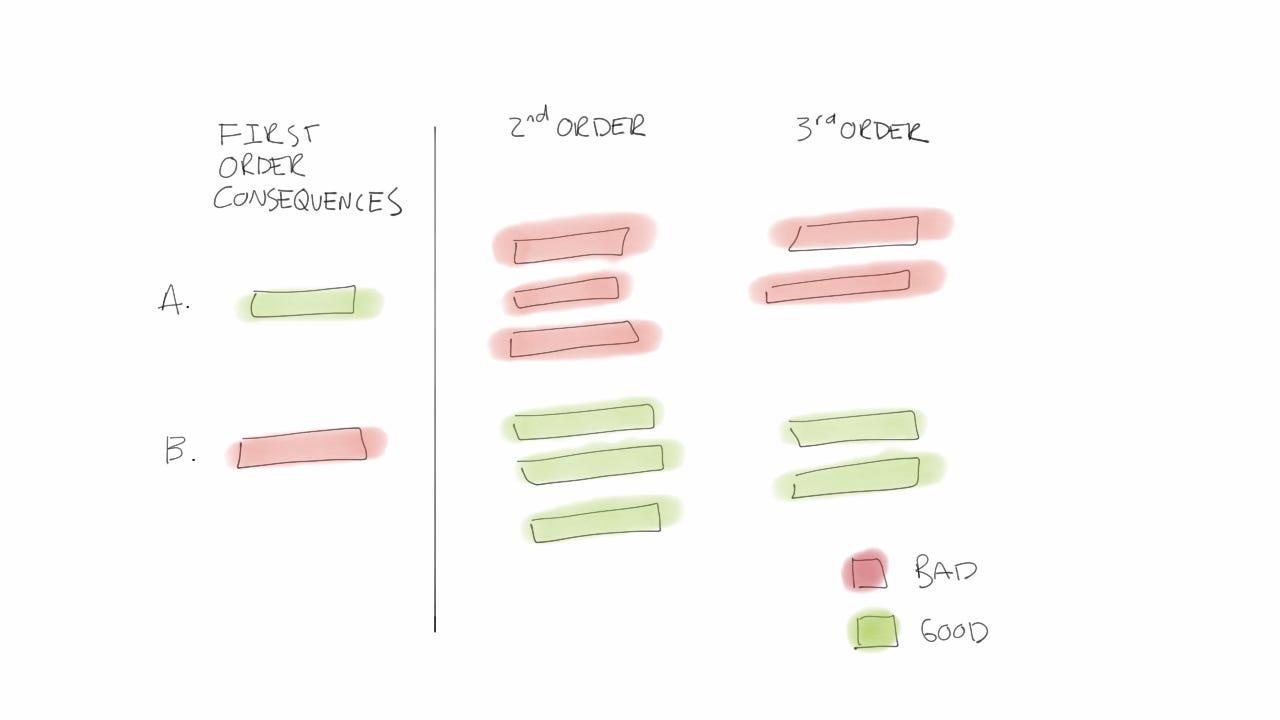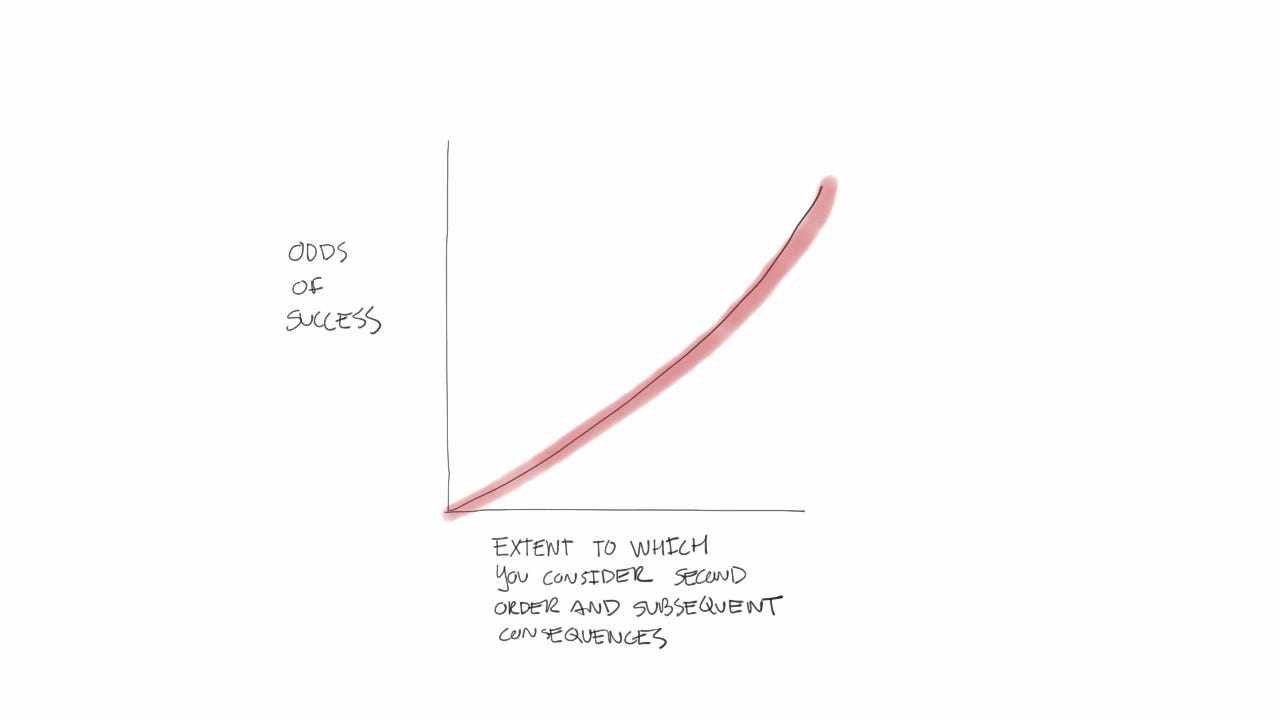Hi there!
Reading time: About 7 minutes
Quote
“I would rather have questions that can't be answered than answers that can't be questioned.”
― Richard Feynman
Mental Model
Second order thinking
I have been binge watching a show recently and in that show there was a mention of unintended consequences. The main hero of the show kills a rich businessman who profited by created a disease and then selling the drugs to cure that disease. The unintended consequence of him playing judge, jury and executioner was the fact that this rich guy’s son was a nutcase and he grew up to become a supervillain. He made it his life’s work to get revenge for his father and make the hero seem like a villain. (the show i’m talking about is Arrow)
Now when he made the decision to kill the guy he knew that the consequence of that is a good one. A rich guy who was harming so many people would actually never be able to harm anyone again. But that rich guy had a family and his family wanted revenge on the person who killed his father.
“Failing to consider second- and third-order consequences is the cause of a lot of painfully bad decisions, and it is especially deadly when the first inferior option confirms your own biases. Never seize on the first available option, no matter how good it seems, before you’ve asked questions and explored.”
—Ray Dalio
A little bit of second order thinking would probably be of tremendous help to the Arrow.
What is second order thinking and how can it be of help?
It is basically the ability for us to think through the second, third and nth consequence or order. We usually think in the first order. We think about the immediate consequence not the consequences that are far out.
In his exceptional book, The Most Important Thing, Howard Marks explains the concept of second-order thinking, which he calls second-level thinking.
First-level thinking is simplistic and superficial, and just about everyone can do it (a bad sign for anything involving an attempt at superiority). All the first-level thinker needs is an opinion about the future, as in “The outlook for the company is favorable, meaning the stock will go up.” Second-level thinking is deep, complex and convoluted.
First order thinking is easy. We do it all the time. Think about the times where you decide scrolling through instagram for a while and eating ice cream has no harm. We don’t think that if we think like this daily for a long time what happens is this time multiplies and we feel regret. Over the year I must have spent an hour on Instagram minimum it is crazy to think that over 2 years I must have spent over 30 days that is almost an entire month on Instagram. And trust me 1 hour is an understatement to how much time I spend on Instagram. It is astonishing how much time we waste thinking 2 hours of time pass is worth it.
Second order thinking requires us to look into the future. It requires us to ask the question ‘and then what?’ In second order thinking a person would probably think scrolling through instagram for more than an hour might become a daily habit and then this might become an addiction where over a year I would have spent a lot of time doing things that give me cheap dopamine and no real pleasure. This person would simply delete the app.
The people who do extraordinary things have a knack of seeing things others cannot see and thinking in ways others do not understand. These people think in second order. Think of a person like Kobe Bryant, see Kobe's training routine the man had a clear aim thinking if he does 4 hours of training more than everyone else over a few years his ability and his peer’s abilities will have a difference that cannot be matched. He thought long term. He thought about how this little bit of extra training over time will give him the success he wants.
Source: Farnam Street
In Investing
Investing is all about thinking second order consequences. You have to account for the unaccountable. We need to think deep when we decide to invest in a company. We read their annual reports we run it through our checklist and then we evaluate if the company is good or not. What we need to do is think long term and think about what ripple effects are possible and what is the worst case scenario for the company. If the answer does not scare you, it is a good sign. We should always ask the question ‘and then what?’ . I am not the best person to give advise on second order thinking as I am still a beginner but it is something you can try and implement.
How to Implement
“Here are three ways you can use to put second order thinking into practice today.
Always ask yourself “And then what?”
Think through time — What do the consequences look like in 10 minutes? 10 months? 10 Years? 1
Create templates like the second image above with 1st, 2nd, and 3rd order consequences. Identify your decision and think through and write down the consequences. If you review these regularly you’ll be able to help calibrate your thinking.
(Bonus) If you’re using this to think about business decisions, ask yourself how important parts of the ecosystem are likely to respond. How will employees deal with this? What will my competitors likely do? What about my suppliers? What about the regulators? Often the answer will be little to no impact, but you want to understand the immediate and second-order consequences before you make the decision.” ~ Farnam Street
It is a good thing to note that the people who use first order thinking are people who are looking for an easy answer, pressed for time, inexperienced in our role or field (or overly confident in our abilities), experiencing strong emotions, or isolated from other points of view.
Interesting find
Thoughts
A common topic for discussion with my friends is usually the topic of why one should read books. Everything you want can be found online. I always fail to answer this question with conviction I usually just say books are just a personal preference or they are better. But what is the reality? I still am not sure why books are the way to go to get knowledge especially since Youtube, Google, Blogs, etc. exist. The only thing that I can think of is the fact that they are meant to coexist as sources of knowledge. When I read a book my thinking cap is turned on. I underline the things that are interesting to me and then I think about it and try and relate the things to my life. It is not a knowledge source for me it is my time to think and analyse. Whenever I come across a topic I like in a book I spend some time thinking about it. I think this helps me grow. I am not sure but the experience of getting knowledge from the internet and getting it from a book is different.
Anyways if you have any thoughts or things to add as to why books are better or worse please let me know in the comments.
That’s it for this week!
Enjoy your weekend! Happy learning!




